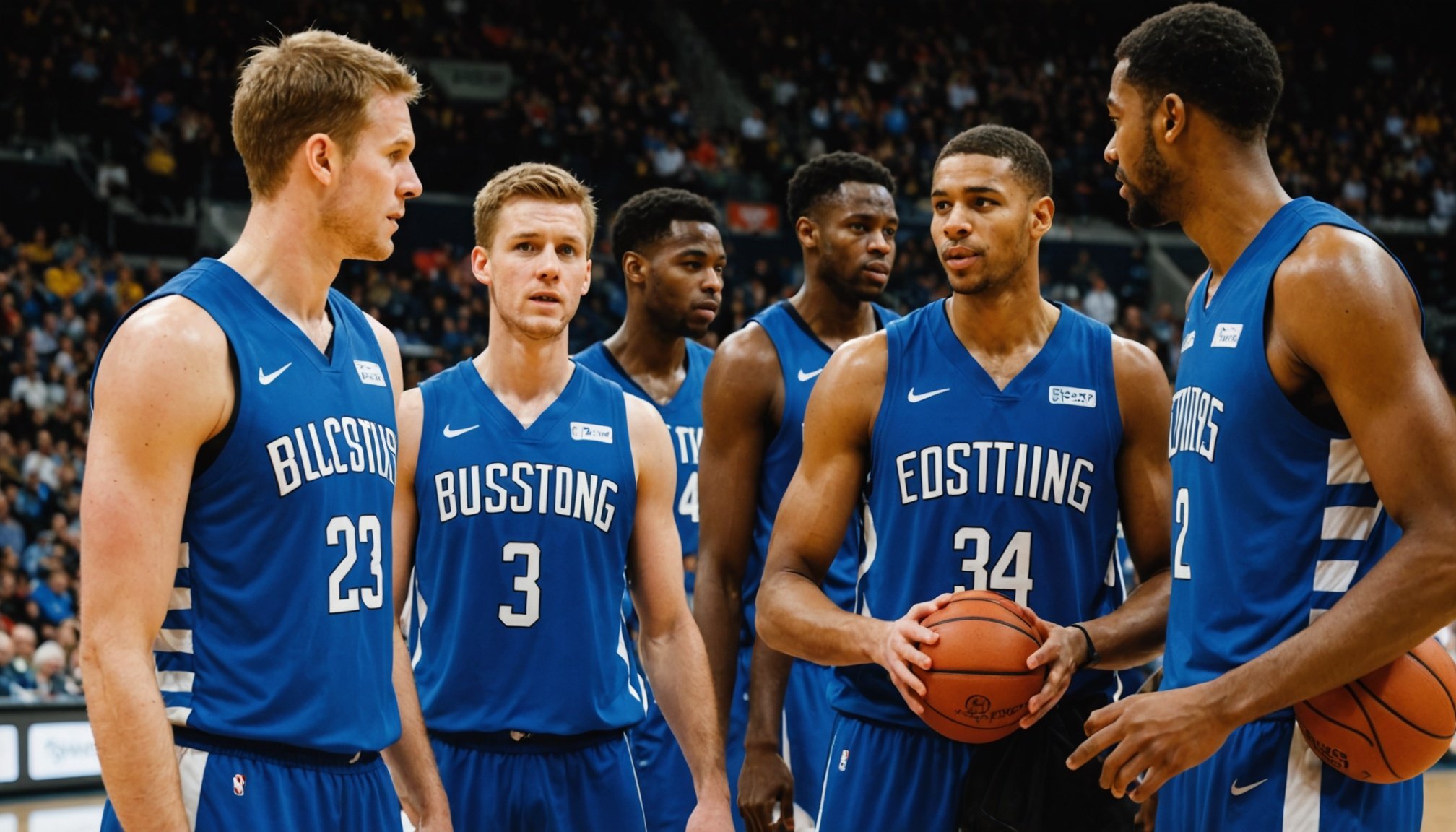Top Strategies for Fostering Team Chemistry in UK Basketball: Unlocking Success on the Court
Understanding the Importance of Team Chemistry
When it comes to basketball, or any team sport for that matter, the concept of team chemistry is often cited as a crucial factor in determining the success of a team. Team chemistry is more than just about individual skills; it’s about how well the players work together, communicate, and support each other both on and off the court. In the UK, where basketball is gaining increasing popularity, fostering strong team chemistry is essential for any team aiming to achieve peak performance.
Building Trust and Communication
Trust and effective communication are the foundation of any successful team. Here are some strategies to build these essential components:
Topic to read : Top Strategies for UK Basketball Players to Conquer Pre-Game Anxiety
Team-Building Activities
Organizing team-building activities outside of regular practice sessions can help players bond on a personal level. This could be anything from a simple team dinner to a more structured activity like an escape room or a volunteer day. For example, the NBA’s Jr. NBA&AFD Basketball Experience, although focused on youth development in Africa, highlights the importance of social cohesion through sports, which can be applied universally[4].
Open Communication Channels
Coaches should encourage open and honest communication among team members. This can be achieved through regular team meetings where players can express their thoughts, concerns, and ideas. A head coach who fosters an environment where every player feels heard can significantly enhance team cohesion.
Additional reading : Essential Warm-Up Exercises to Safeguard UK Basketball Players from Hamstring Injuries
Player Feedback
Regular feedback sessions between coaches and players, as well as among players themselves, can help in building trust. Constructive criticism and positive reinforcement can go a long way in improving performance and strengthening team bonds.
Developing Mental Toughness
Mental toughness is a critical aspect of any sports team, and basketball is no exception. Here’s how you can develop it:
Mental Health Support
Ensuring the mental health and well-being of players is vital. Teams can benefit from having a sports psychologist or mental health professional who can provide support and strategies to manage stress and pressure. This is particularly important in elite sports environments where the pressure to perform can be intense.
Positive Mindset Coaching
Coaches can incorporate mental toughness training into their coaching programme. This includes techniques such as visualization, positive self-talk, and resilience training. For instance, Katie Sadleir, the CEO of the Commonwealth Games Federation, emphasized the importance of a collaborative, flexible, and sustainable model that includes social impact, which can indirectly contribute to mental well-being by creating a supportive team environment[1].
Enhancing Skills and Performance
While team chemistry is crucial, individual skills and overall team performance are equally important. Here are some strategies to enhance these aspects:
Focused Coaching
A good coach is key to developing both individual and team skills. Coaching should be focused, with clear goals and strategies for each player and the team as a whole. For example, in the PASSER’ELLES programme, experienced athletes mentor younger players, sharing strategies for managing pressure and improving performance[2].
Practice and Training
Regular and structured practice sessions are essential. Coaches should design training programmes that not only improve physical skills but also enhance teamwork and strategy. This could include drills that focus on teamwork, such as passing and defensive strategies.
Analyzing Performance
Using data and video analysis can help coaches and players understand their strengths and weaknesses better. This can be particularly useful in identifying areas where team chemistry can be improved, such as communication during games or support off the court.
Engaging with the Community and Social Media
Engaging with the community and leveraging social media can also play a significant role in fostering team chemistry and promoting the team.
Community Outreach
Teams can engage in community outreach programmes, such as coaching clinics for local students or participating in charity events. This helps in building a sense of unity and purpose beyond just the team itself.
Social Media Presence
Maintaining a strong social media presence can help in building a community around the team. Players and coaches can use platforms like Instagram, Twitter, and Facebook to share updates, behind-the-scenes insights, and personal stories. This can help fans feel more connected to the team and can also serve as a tool for players to support each other publicly.
Examples of Successful Team Chemistry
The NBA’s Jr. NBA&AFD Basketball Experience
This programme, while focused on youth development, demonstrates the power of community engagement and social cohesion through sports. By providing a platform for young players to develop their skills and build relationships, it sets a strong foundation for team chemistry[4].
The Commonwealth Games
The Commonwealth Games, despite facing challenges in recent years, have managed to maintain a strong sense of community and teamwork among participating nations. The integration of para sports into the main programme, for instance, highlights a commitment to inclusivity and teamwork[1].
Practical Advice for Coaches and Players
Here are some practical tips that coaches and players can implement to foster strong team chemistry:
- Regular Team Meetings: Hold regular team meetings to discuss strategies, address concerns, and build trust.
- Team-Building Activities: Organize activities outside of practice to help players bond on a personal level.
- Open Communication: Encourage open and honest communication among team members.
- Mental Health Support: Ensure access to mental health professionals to support players’ well-being.
- Focused Coaching: Design coaching programmes that focus on both individual skills and team strategies.
- Community Engagement: Engage in community outreach programmes to build a sense of unity and purpose.
Table: Comparing Team Chemistry Strategies
| Strategy | Description | Benefits | Examples |
|---|---|---|---|
| Team-Building Activities | Organize activities outside of practice | Builds personal bonds, enhances trust | NBA’s Jr. NBA&AFD Basketball Experience[4] |
| Open Communication | Encourage honest communication among team members | Improves trust, resolves conflicts | Regular team meetings |
| Mental Health Support | Provide access to mental health professionals | Enhances well-being, reduces stress | Incorporating sports psychologists |
| Focused Coaching | Design coaching programmes with clear goals | Improves individual and team skills | PASSER’ELLES programme[2] |
| Community Engagement | Engage in local community outreach | Builds unity, promotes team | Coaching clinics for local students |
| Social Media Presence | Maintain a strong social media presence | Connects fans, supports team members | Sharing updates and personal stories on social media |
Quotes from Experts
- “With PASSER’ELLES, we want to offer young women a chance to flourish in a universe often reserved for men. It is crucial to provide them with role models they can identify with.” – Anne-Marie Gaultier, Marketing Director of ALDI[2]
- “The collaboration between NBA Africa and the AFD continues to grow as we expand the scope of this initiative to reach more young people in other countries on the continent.” – Matungulu, commenting on the Jr. NBA&AFD Basketball Experience[4]
- “The Commonwealth Games of 2026 will be a bridge to the future, a first exciting step in our project to reset and redefine the Games as a truly collaborative, flexible, and sustainable model.” – Katie Sadleir, CEO of the Commonwealth Games Federation[1]
Fostering team chemistry in UK basketball is a multifaceted process that requires a combination of trust, communication, mental toughness, and focused coaching. By implementing these strategies, teams can unlock their full potential and achieve success on the court. Whether through team-building activities, open communication channels, or community engagement, the key is to create an environment where every player feels valued and supported. As the sport continues to grow in the UK, the importance of team chemistry will only become more evident, making it a crucial aspect of any coaching programme.






